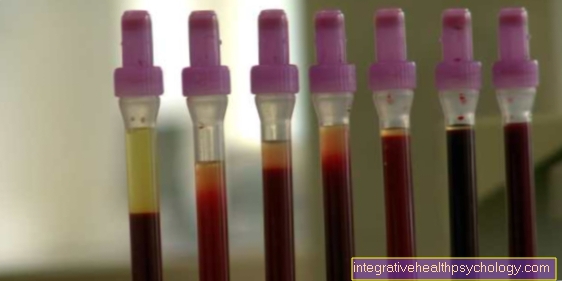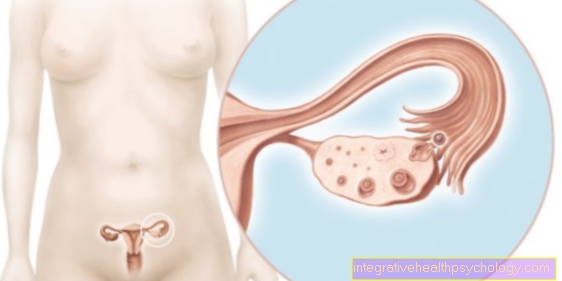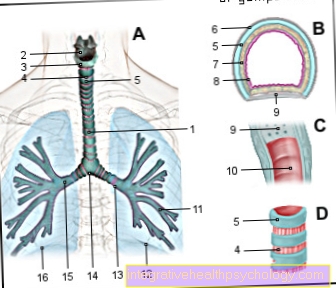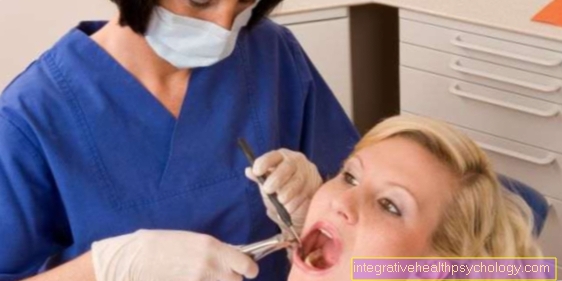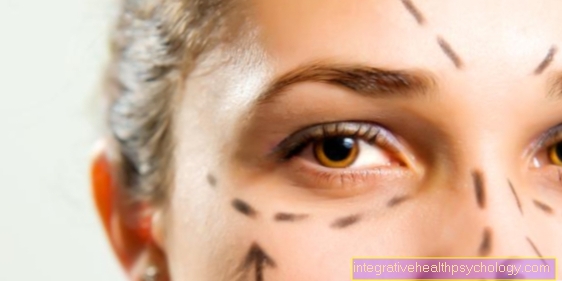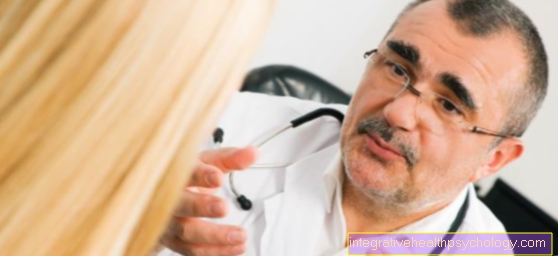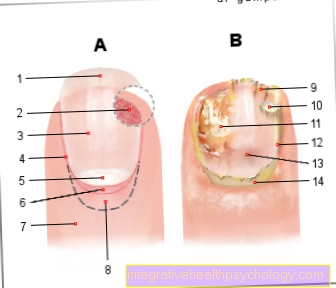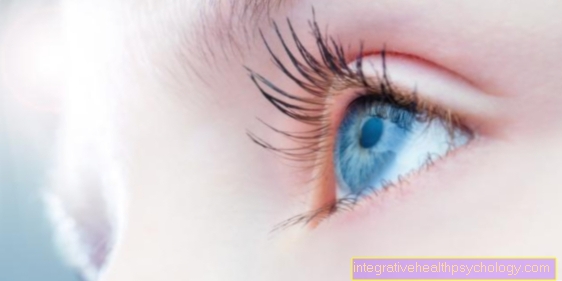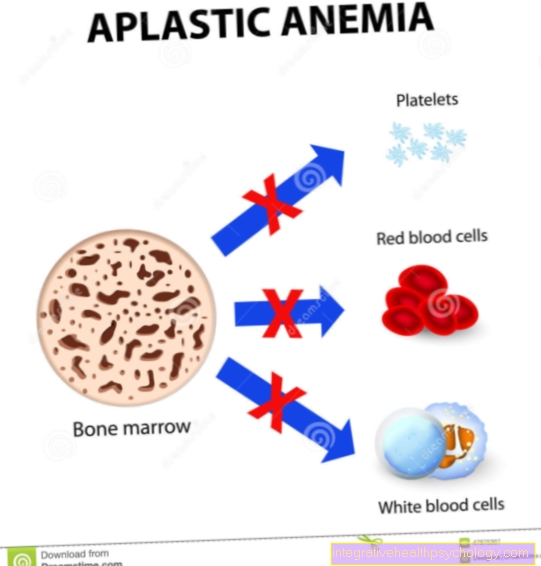Herpes nose
introduction
Itchy, burning blisters on reddened skin combined with unsightly, yellowish crusts indicate an infection with herpes. In the area of the lips in particular, many sufferers suffer from the annoying and painful disease. Doctors then speak of "Herpes labialis"- also popularly known as" cold sores ".
Less common, but just as unpleasant, is infection with the pathogenic viruses in the nose area. Both the inner mucous membrane and the outer skin of the nose can be affected ("Nasal herpes"). Tormenting itching often causes those affected to touch the small foci of infection with their fingers and thus spread the pathogens to other skin areas on the face or body. However, strict hygiene and suitable ointments can help in most cases!
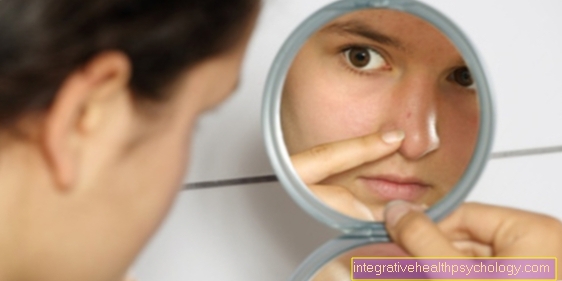
root cause
About 90% of the population bear the responsibility Herpes simplex virus-1, HSV-1 for short, in her body. During the early childhood, people with the virus mostly kick it in contact unnoticed. In some cases, this primary infection occurs in children as "Mouth rot“In appearance.
After the virus enters the body, it can lifelong in the nerve nodes (lat .: Ganglia) remain. Affected are so either symptom-free (asymptomatic) Carriers or it comes about 50% of the cases to a so-called "reactivation“The herpes virus.
But what is reactivation? If our Weakened immune system is e.g. by illness, psychic stress or fever, the viruses reach the affected skin regions via small, sensitive nerves and trigger the typical symptoms there. Usually, reactivations can be done especially around the lip observe. Occasionally, but can also use the nose be affected by herpes.
Much more often as a reactivation in the nasal area, however, is one direct transmission of viruses. In particular with cold sores, the pathogens get over our fingers to other areas of the facelike the nose. Small mucosal injuries or sore skin, e.g. caused by a cold, also favor herpes disease.
In recent years, there has also been a steady increase Increase in infections in the face area by the Herpes Simplex Virus-2 be recorded. Usually, this pathogen is responsible for genital herpes infections (Genital herpes) responsible, but can e.g. at inadequate hygiene also reach the lip or nose region.
Cold as a cause of nasal herpes?
As part of a cold, our immune system can be affected. If even the tiniest cracks appear in the mucous membrane and surrounding skin as a result of frequent nose blowing, herpes viruses have an easy time of it: the herpes reactivates and breaks out. The vernacular used to call this phenomenon "fever blister".
For those affected, a cold and nasal herpes are a significant burden and sometimes extremely difficult to deal with. It is easy to create a vicious circle between breaking open the cold sore when blowing your nose and re-infection due to inadequate hygiene.
Cold as a cause of nasal herpes?
The herpes virus is very widespread in the population. More than 90% of adults have a latent infection with the herpes virus-1, which also causes nasal herpes. However, that doesn't mean that the herpes always causes symptoms. Rather, the virus slumbers unnoticed in the human body and is reactivated in some situations, so that the herpes outbreak occurs. So a cold in and of itself cannot trigger or cause herpes on the nose. There must first be an infection with a herpes virus.
Usually this takes place at some point in childhood, for example through contact with cold sores. Typical triggers for reactivation of the virus are stress, febrile infections, increased exposure to the sun or various conditions in which the immune system is weakened.
Symptoms
Before typical vesicles can be seen, patients often sense a Tingling or pain in the affected area. This is followed by small red vesicles arranged in groups on the nose. After a short time, the skin symptoms fill up yellowish, liquid secretion. Of the The contents of the vesicles contain millions of viruses and is therefore highly infectious! Finally burst the pustules on and merge with each other, so that small, sometimes very painful wounds arise.
If the Nasal mucosa is affected, blowing your nose or sneezing can be extremely uncomfortable! In addition, the The healing process is made much more difficult, as viruses can also rise up inside the nose. Ultimately, form very itchy crusts, it comes to Scabbing and finally to Healing. The small cold sores usually heal without scarring from.
Usually, the symptoms of herpes around the nose are purely local. In severe casesif e.g. If the entire nasal mucous membrane is affected, patients can experience not only considerable pain but also a general feeling of illness Fatigue, tiredness, or headache feel.
diagnosis
Herpes infections are almost always very easy to diagnose. A more precise one Look of the doctor is usually sufficient to make the diagnosis of herpes nasalis. To be on the safe side, your treating doctor may be able to do one Smear of the vesicle secretion make and in laboratory have possible virus DNA determined.
therapy

Once infected with the herpes virus, the remains Pathogens in our body for life. Therapeutically so it is Not possible the herpes simplex virus-1 to remove. For those affected, however, a herpes infection in and on the nose is a particular problem great burden in addition to partly Patients often experience considerable pain and itching Shame or even disgust for their illness.
To the Abbreviate the course of the disease and to prevent the vesicles from spreading, so-called "Nucleoside analogs" for use. she prevent the virus from multiplying and promote such a thing faster healing. In the form of cooling gels, creams or nasal ointments they can easily be applied locally to the affected areas. Common substances include Acyclovir or valaciclovir. For e.g. Very large spread in the entire nasal mucosa or face, severe feeling of illness or a weakened immune system may even be one systemic gift of drugs in the form of Tablets or infusions required.
If the Despair great is, those affected often resort to various, supposedly effective ones Home remedies. Attempts to treat the annoying bubbles with toothpaste, essential oils, vinegar etc. strongly discouraged! By unnecessarily irritating the sensitive nasal mucous membrane, crusts can break open and the highly infectious contents spread to neighboring skin regions.
In addition to drug therapy, there are strict ones Hygiene measures first of all. Wash your hands regularly, avoid contact with the virus-containing blisters and use your own towels.
What to do with herpes on the nose
Herpes on the nose can be perceived as very distressing due to painful and itchy blisters.
Usually a cream or ointment with the active ingredient acyclovir is enough to get the problem under control. This is applied to the affected areas. The treatment is completed on average after 2 weeks.
In some cases, however, local treatment is not enough and tablets must also be taken. These are usually prescribed by the doctor. Here, too, the antiviral agent acyclovir is an important lead substance.
It is particularly important for the success of the therapy not to manipulate, prick or touch the cold sore. This will only spread the virus and make successful treatment more difficult.
Home remedies for treating herpes on the nose
One often reads about home remedies that are to be used for herpes in general and especially for nasal herpes in order to achieve a cure.
At this point, however, we can only advise against using home remedies. Even if these can be very helpful in many other cases, home remedies for nasal herpes are more than counterproductive. They are ineffective because they ultimately cannot fight the virus and delay effective treatment with antiviral drugs. In addition, manipulating the nose with home remedies can lead to the germs being carried over the hands and face and worsening the course of the disease and promoting the infection of other people.
Read more on the topic: Home remedies for herpes
Herpes on the nose during pregnancy
The herpes virus can also reactivate during pregnancy and, as a result, symptomatic nasal herpes. Due to the changing hormone level, the immune system of pregnant women can “get mixed up” for a short time. Herpes viruses use this temporary immune system weakness and trigger the disease.
A local nasal herpes usually does not represent an increased risk for the unborn child. Before using ointments or creams, pregnant women should definitely consult their doctor.
You might also be interested in: Cold Sores During Pregnancy - Is It Dangerous?
Herpes on the nose in the baby
Babies may become infected with the herpes simplex virus-2 during birth. It is not uncommon for affected mothers to be unnoticed carriers of the virus and transmit the pathogens to their child in the birth canal.
Symptoms can be present at birth, but also 4-6 weeks after birth. Usually this virus causes genital herpes, but it can also cause infections of the face such as cause of the nose. Since the immune defense is not yet fully developed, especially in babies, possible complications are dangerous. Your attending pediatrician will be able to discuss possible therapy options with you. However, timely intervention is essential!
Read more on the topic: Herpes baby
How contagious is nasal herpes?
Nasal herpes can lead to infection through contact with the infectious contents of the cold sore. Therefore, those affected should refrain from touching the cold sore. As a result, viruses are carried on the hands and passed on when other people are touched.
It can also be distributed on the face. Heavy sneezing can also cause the viruses to spread and infect other people. It is therefore advisable to sneeze into handkerchiefs if possible and then dispose of them.
Frequent hand washing also prevents transmission. Furthermore, the cold sores should not be touched, even if they are sometimes painful and itchy.
For more information, see the next article: That's how contagious fever blisters are
prophylaxis
Basically, our body can be infected with the herpes viruses do not avoid. A healthy and strong immune system, conscientious Hygiene measures and avoiding potential trigger factors (e.g. stress, UV light) can cause infection, however prevent.
If you especially often under Nasal herpes more targeted measures to strengthen your natural defenses may be indicated. Especially in the Alternative medicine those affected can discover numerous possibilities.
forecast
Treated on time are herpes infections of the nose easily treatable diseases. Often the disease is even often self-limitingi.e. Even without drug therapy, the blisters heal on their own after a while. At weakened immune system, Pre-existing conditions or damaged skin, however, can also be a seemingly harmless infection partly dangerous become.
In particular in Open vesicle stage, other germs can additionally infect the small injuries ("Superinfection"). Especially bacteria cause so very painful, bloody, purulent rashes.
Neurodermatitis Patients must especially careful be! In rare cases can the herpes viruses other organs, how brain or eyes, damage. Because of the difficult hygienic conditions in the area of the nasal mucosa, patients may have to rely on one longer course of illness to adjust.
Can herpes patches also be used on the nose?
Herpes patches, such as those available from the company "Compeed", are mostly advertised for the treatment of cold sores.
They can also be used for nasal herpes, but only for external use. The patches are not suitable for use in the nose.
Is there a difference between nose sores and cold sores?
Nasal herpes and cold sores are caused by the same herpes virus, HSV-1. Almost 100% of adults carry this virus in themselves and are usually infected with it in early childhood, especially through direct contact with cold sores.
Various factors can cause the virus, which is dormant in the body of the infected person without causing symptoms, to be reactivated. In this case, cold sores and nasal herpes can also occur in parallel and plague the person affected. Typical triggers are stress, feverish infections, increased exposure to the sun or an immune deficiency. Treatment with acyclovir ointment is common for both types of herpes.



-cola.jpg)

